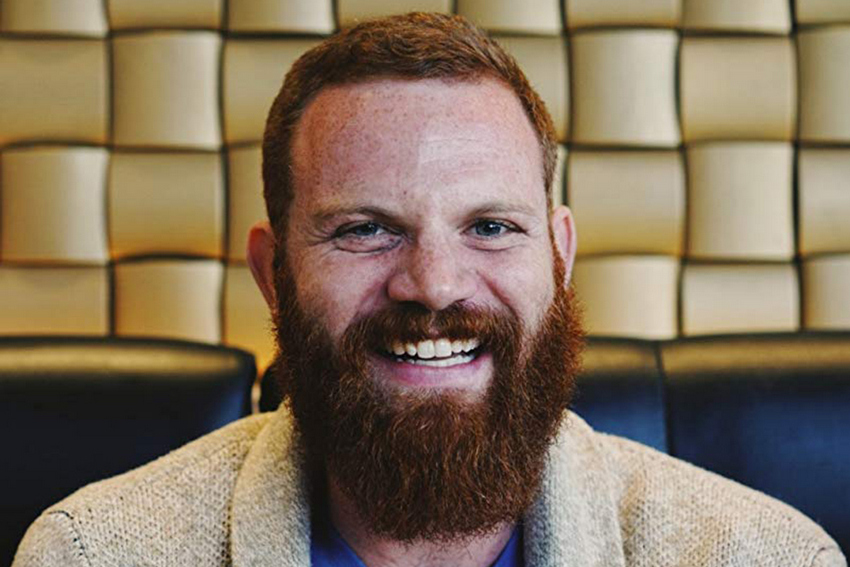
Michael Feld is the director of “40 Minutes Over Maui“. The story came to us originally from Michael’s father, Steve, who’s a writer and often writes pieces inspired by true-life events. The first draft was sort of an imagining of Michael’s parents being in Hawaii at the time of the crisis. Steve wrote the original script and sent it to Michael with the note to “Take the script and run with it!”
Michael loved the script and reached out to his friend Josh Covitt about a potential collaboration. Michael and Josh met six years ago playing on an adult kickball team and grew their friendship through their involvement in improv comedy. Michael had a feeling that he and Josh would make a great directing team, so he approached Josh to rewrite & co-direct the film – a decision that ended up working amazingly well. Not only did working on “40 Minutes Over Maui” deepening their friendship, but it also set them off on the path of being a working directing duo.
When it came to a producer, Michael reached out to Brent McHenry, an old friend from the University of Southern California. Brent and Michael had never worked together at USC, but Michael always admired Brent’s output of work and his calm demeanor. And it wasn’t just friends involved in the producing and directing of “40 Minutes Over Maui” the entire production had an intimate feel from top to bottom. Whether it was enlisting Michael’s roommate as the editor, or Michael’s own mother cooking the crew quiche for breakfast, everyone invested in the film as if they were family, and many of us have seen our personal and professional relationships blossom because of it.
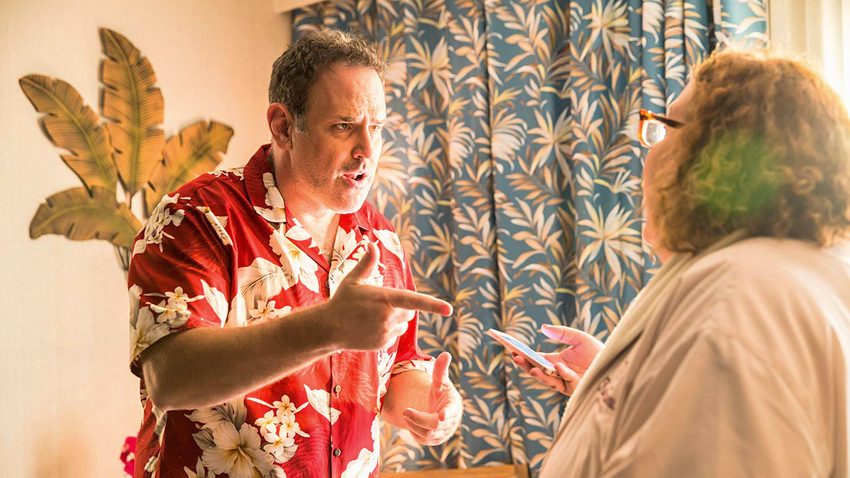
As far as marketing goes, it’s been a journey to help find audiences for the film. It’s our first film together and first festival run, so there’s a lot of new territory we’re navigating. You discover that when you make an independent film, the film isn’t over once you’re picture locked. You then put on a different hat where you have to learn how to market, distribute, and exhibit your film. We’ve learned so much in the marketing process and look forward to seeing the film continue to make its way to audiences.
indieactivity : Did you start writing with a cast (You or any) in mind?
Michael Feld : We always knew we wanted to tap into the improv community we are a part of. Josh performs every week at Upright Citizens Brigade and Michael went through the whole training program there. Once we had the script locked we went out to Julie and Johnny, knowing they had exactly the right feel we wanted for Penny and Larry – people who felt like a real couple, who we could trust to work the script with us while offering up on the spot adjustments and improvs as needed.
indieactivity : How long did you take to complete the script? (Do you have a writing process?)
Michael Feld : Luckily we had an amazing first draft to work with, so that gave us a great head start. And within a month we had the new script that we sent out to our actors and producers. Aside from keeping the script under 15 pages, things that we spent a lot of time on were making sure Larry and Penny felt like they still loved each other even in their most high-stress moments. With Josh’s acting background and Michael’s work in documentaries, we’re very keen on making sure that everything that our characters say and do is believable to an audience and feels authentic. Our actors also let us rehearse a few times as if we were working a one act play, and some revisions to the script were made based on what we saw in rehearsal. There’s no better tool than hearing your words out loud to know if they’ll work.
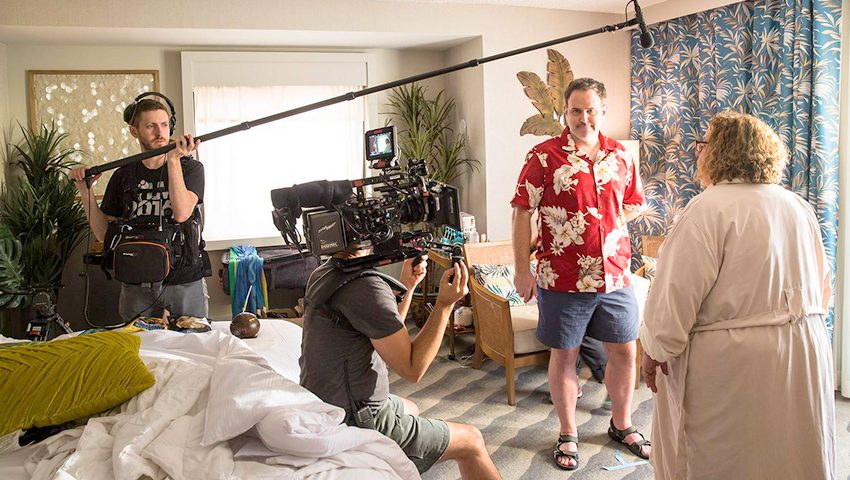
indieactivity : When did you form your production company – and what was the original motivation for its formation?
Michael Feld : We have yet to form an official production company but plan on it as we have many projects and ideas in development at the moment.
indieactivity : What was the first project out of the gate?
Michael Feld : “40 Minutes Over Maui” was our first project together – and hopefully the first of many down the road. We’re currently writing a feature while we’re in pre-production for two other shorts.
indieactivity : During production, what scene (that made the cut) was the hardest to shoot?
Michael Feld : There weren’t many scenes or parts that were very hard to shoot; rather we were on such a tight schedule that what was difficult was making sure we got what we needed and got it quickly. We learned very quickly the importance of moving onto the next shot or setup once we felt good about what we filmed. It’s tricky when your actors are so enjoyable to watch, but you have to learn not to luxuriate in extra takes – even if you’re laughing hysterically.
indieactivity : What works better in this latest production that mightn’t have worked so well in the last one you did?
Michael Feld : In this production, I (Michael) involved a significantly greater number of people than in the past. In the past, when I’ve made documentaries it’s been a very small ragtag crew of only 4-5 people. This production had a crew of about 30 people who all worked their tails off and made the production remarkably smooth and easy.
indieactivity : You produced and directed the film, what measure of input did it take to don these hats?
Michael Feld : When you’re directing a film that you’re paying for, you need to know when to say “no” to expenses and know when to say “yes”. We wanted to pay the cast and crew and we didn’t want this to be a shoestring budget. The level of input is more based on knowing how and where to spread your finances and resources. We also always made sure we had a well-fed cast and crew and made sure there was lots of Topo Chico on set for people (but mostly Michael, as he has a healthy addiction to the stuff).
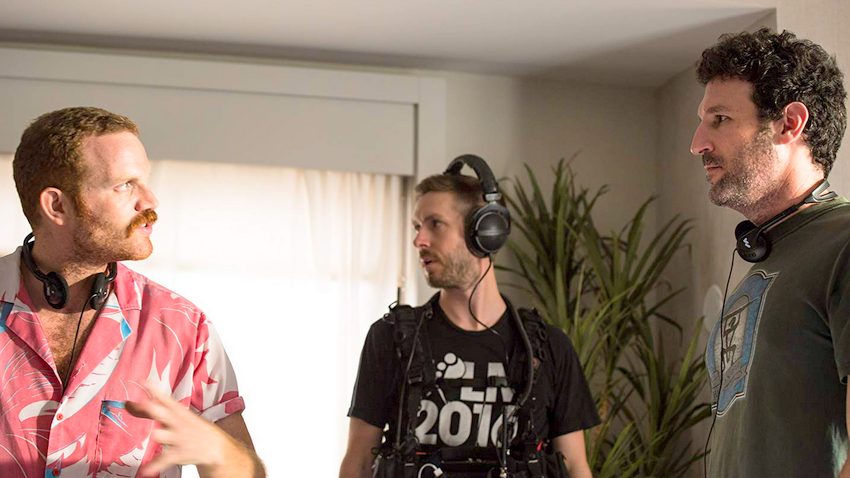
indieactivity : Is there anything about the independent filmmaking business you still struggle with?
Michael Feld : As we mentioned before, figuring out how to submit to the right festivals and getting your film out there to an audience is a huge learning curve. It’s like a whole separate education that film school can’t prepare you for. We’ve had some filmmaker friends who’ve had successful shorts share their experience with us and give tips, but it’s hard to know what it’s like until you experience it with your own work.
When you make a film, you try not to make it with the intention of getting into a specific festival, but when it gets accepted places you’re hoping for, it makes all the hard work worth it. Another minor struggle is that a lot of independent films, and especially short films, seem to focus much more on dramatic material and stories. So with a comedy, it can surprisingly be a struggle to find the right type of festival that’s looking to program a healthy dose of laughter.
Much of the marketplace can tilt towards drama, heavy genre-angles, or advocacy films – which we appreciate and agree are important, but we wanted to create something that was unabashed about making audiences laugh. Like the iconic director Preston Sturges once said, “There’s a lot to be said for making people laugh. Did you know that that’s all some people have?” It’s precisely because it’s a dark time in many ways in the world today that we think it’s also a perfect time to sit back and laugh at ourselves, which is what we hope we’ve done with “40 Minutes Over Maui.”
indieactivity : Where do you think your strengths line as a filmmaker?
Michael Feld : Both of us have a very strong nose for bullshit – as in, if something doesn’t feel appropriately earned or motivated, we don’t want it in the film. Michael has spent years observing and filming real people and Josh has spent years as an actor experiencing what material works and what doesn’t – so now as directors we can bring that to the table and make sure our films always balance humor with reality.
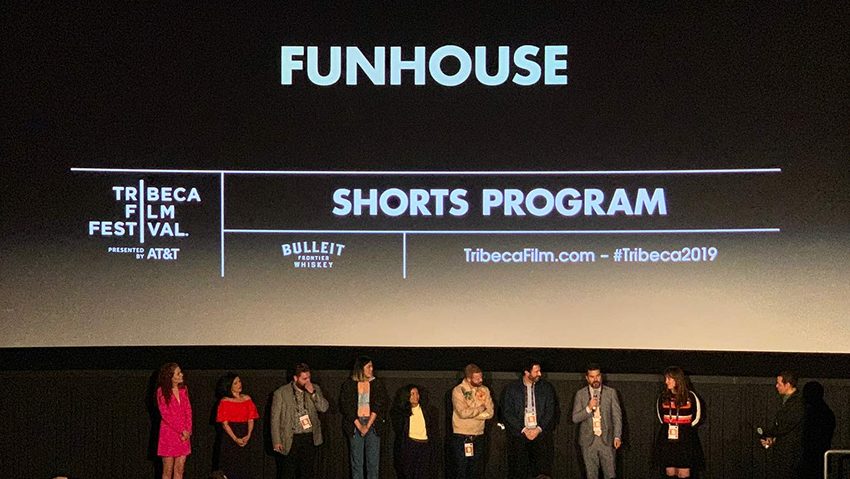
We love actors and take pride in making them feel comfortable and informed of what each scene needs, which means we never have to worry about moving on without getting the performance we want. Also, as a duo, we work well splitting up adjustments between takes – one of us addressing any technical tweaks while the other can give notes to the actors. It saves time and keeps everything moving on schedule. The other thing we take pride in is making sure we create a set environment where everyone feels useful and appreciated. There’s a ton of moving pieces in every production, but that’s not an excuse to not have fun or cultivate a low-stress vibe on set.
indieactivity : Let’s talk finance, How did you finance the film?
Michael Feld : Alcohol, eating out and the band Phish: these are the things Michael gave up in 2018 to pay for “40 Minutes Over Maui.” When he really looked at how much he was spending going out and seeing Phish, he was astonished and knew those thousands of dollars could go towards something bigger and greater.
So the decision was made to empty his savings account, take out a credit card with 0% APR for 15 months, and work a lot of extra shifts bartending, combined with Michael’s dad investing some money. Michael always knew there would come a point in his creative life where a big financial risk would be taken to get something made… he just didn’t know it would happen so soon.
indieactivity : How much did you go over budget? How did you manage it?
Michael Feld : That’s none of your damn business! Sorry for snapping there. We can say that any overages have been managed by picking up more shifts, selling beloved posters from favorite bands, and donating plasma. Only two thirds of that is true…
indieactivity : How important is marketing? Do you think a project can make any dent without it these days?
Michael Feld : Having good marketing is very important. Obviously, word of mouth is the best marketing strategy but a lot of times you need to do an intial push so you can get it to those first “mouth”s that can recommend your film to others.
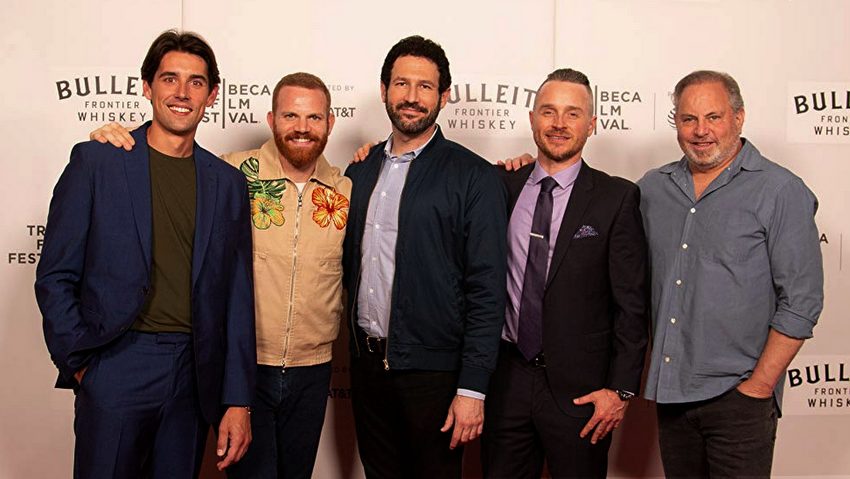
indieactivity : Can you tell us about your marketing activities on the project – and how it’s gone for you?
Michael Feld : You have to stay in people’s mind and on their radar when you have a short film making the rounds. We have what we call “Maui Mondays” where we try and add to our social media network every week. Even if we don’t have news, we try and post photos from the shoot or a little tid-bit about something that happened, just so people don’t forget about the film. There is also a very fine line to walk with marketing where you’re not promoting so often that you’re annoying your audience, because at the beginning the majority of your audience is friends and family. Don’t post too much, don’t take yourself too seriously, don’t brag and boast – just be sincerely proud and gracious in regards to the accomplishments the film has and the journey it’s on.
indieactivity : What do you hope audiences get from your film?
Michael Feld : First and foremost, we want audiences to laugh – a lot. Our goal is to make films that people want to see and feel good about spending the time to watch. There’s so much content these days, even asking an audience to give us the 13 minutes for “40 Minutes Over Maui” is a big ask. We also hope the audience falls in love with Penny and Larry as much as we did, and that maybe they see a little bit of themselves in the film – or at least think “what would I do in that situation?”
indieactivity : What else have you got in the works?
Michael Feld : We’re very excited about the feature we’re developing. Without giving too much away, we can say it’s a teenage post-apocalyptic comedy. We like to joke that Maui was our “pre-apocalyptic” film and now we’re moving on to “post-apocalyptic.” We’re also shooting two other shorts in the fall, one centers around a wedding videographer and his struggle to finish a project that’s been thrown a curveball, and the other piece is sort of an emotional science fiction film about a character who’s afraid to show his true identity.
indieactivity : You directed the film, what measure of input did it take to don these hats?
Michael Feld : I remember asking Julie Brister “how do you like to be directed?” and she told me “no director as ever asked me that” and then she explained what works best with her. As a director, I was able to let my guard down and know how and what to do to make our actors feel as comfortable as possible. It was a simple but important question that really guided my approach to directing because it was such a collaboration.
When you’re writing, you see how your characters act and behave in your mind’s eye but when you get it on its feet, you’re now working actual people so instead of just writing and telling characters what to do in the writing process, when you’re directing, it’s a process of working with a real person who is bringing their experience, feelings and time to the project and I always wanted to keep that in mind when we were filming.
Tell us what you think of the interview with Michael Feld? What do you think of it? What ideas did you get? Do you have any suggestions? Or did it help you? Lets have your comments below and/or on Facebook, Twitter, or Instagram! Or join me on Twitter @oladapobamidele
Follow Michael Feld on Social Media
Website
IMDb
Twitter
Instagram
In Camera by Naqqash Khlalid Launch on VOD April 29
Naqqash Khlalid’s Directs Nabhan Rizwan. In Camera stars an EE BAFTA Rising Star Award Nominee.
2025 Philip K. Dick Sci-Fi Film Festival Award Winners Announced
Vanessa Ly’s Memories of the Future Awarded Best PKD Feature
Dreaming of You by Jack McCafferty Debuts VOD & DVD for April Release
Freestyle Acquires “Dreaming of You” for April 15th Release
Hello Stranger by Paul Raschid set for London Games Festival & BIFFF
The film Is set for an April 10th Premiere at The Genesis Cinema in London (LGF) and BIFFF
Daydreamers Official Trailer by Timothy Linh Bui: Released by Dark Star Pictures
Daydreamers Vietnamese Vampire Thriller – May 2nd release
Afternooner by The Harrow Brothers: Funniest Movie of the Decade on VOD & DVD April
Freestyle Acquires “Afternooner” for April Release









